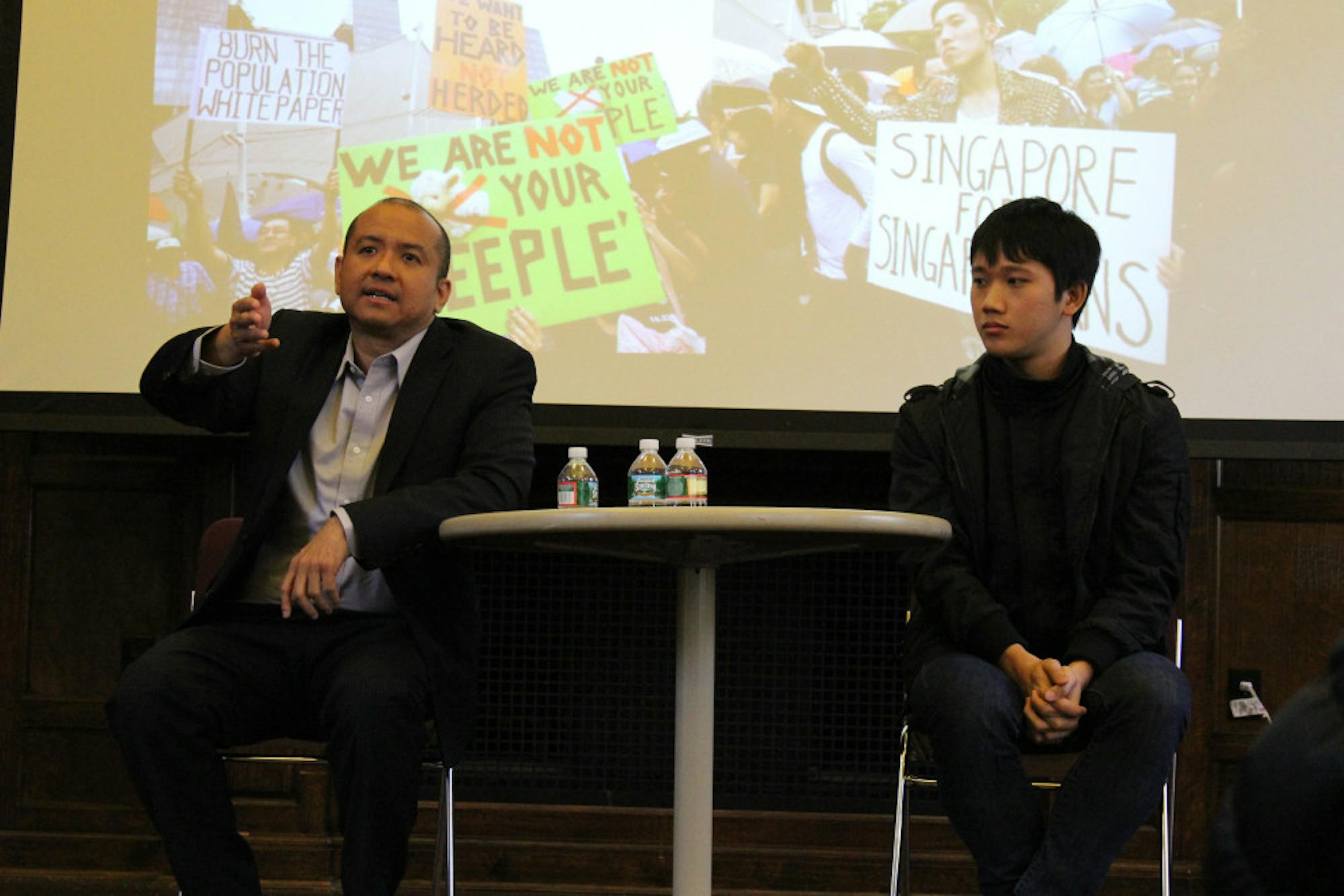Kenneth Paul Tan, vice dean of academic affairs and associate professor at the National University of Singapore’s Lee Kuan Yew School of Public Policy, hosted a lecture about Singapore’s current political situation and the outlook toward its future democratization process in an event titled, "Will Singapore Become a Liberal Democracy?" yesterday in the Crane Room at noon.
The event was sponsored by Tufts Singapore Students Association, the International Relations' Director’s Leadership Council, the Department of German, Russian and Asian Languages and Literatures and the Fletcher Association of Southeast Asian Nations Society.
Tan focused his lecture on the question posed in the title of the lecture, noting that this is a "deliberately unanswerable question."
He explained that it is difficult to answer either way, but noted that recent developments may provide further insight into the question, which serves as a source of tension in a "global city of some distinction," as he called Singapore.
Tan proposed two perspectives that explain the emergence of capitalism and liberal democracy as the final products of a nation's development as posited by Francis Fukuyama, which include the logic of Plato and Hegel.
Both paths start with Plato's idea of the three components of the human soul: intellect, passion and appetite. The Platonic path shows that the combination of intellect and appetite eventually lead to capitalism, while the Hegelian path indicates that passion, including the struggle for recognition, can only be appeased through the universal and reciprocal recognition provided in a liberal democracy.
Tan added that thinkers have claimed that "capitalist liberal democracy becomes the dominant form, maybe the only form, the exclusive form."
Singapore, however, appears to defy this traditional explanation, according to Tan. He underscored, however, that Singapore is still an exceptionally stable, safe, modern and wealthy city.
"And yet it seems to resist these sort of assertions about liberal democratic development, so it’s an exception,” he said.
Tan noted that an analysis Singapore's ability to function without a fully liberal democracy while still being a prosperous nation may provide answers beyond its borders.
"There’s something about Singapore that is bigger than itself," he said.
Tan explained that according to these notions of liberal democratic development, Singapore should include, among others components, a representative government, universal suffrage, rule of law, equality, free media, tolerance and civility, checks and balances and civil society.
Singapore has all of the trappings of a liberal democracy, but he noted that it has historically been a "one-party dominant system." He suggested that the proper processes and structures are in place, but the desired outcome is not yet evident.
Although Singapore first won independence in 1965, Tan harkened back first to the general elections in 1984, noting the continued dominance of the People's Action Party (PAP). He added that the overwhelming majority of seats won by PAP is extremely disproportionate to the actual percentage of votes that it wins.
However, in the 2011 general elections, which have been described as a "watershed election," the PAP won 60.1 percent of the popular vote -- its lowest since the country's independence -- and it lost six seats, more than ever before, according to Tan.
"Something serious was happening in that moment of voting," he said.
He added that the PAP had to seriously consider the implications of this development. Singaporeans, however, achieved a "real sense that they could actually make a difference in terms of electoral outcomes," he said.
Tan then discussed four phases in Singapore's modern history, including its colonial period from 1819-1965, its "survivalist" period from 1965-1970, its developmental period from 1970-1990 and its global city period from 1990-present day.
He spoke about the growth of more oppressive forms of governance and increased state power to drive growth in a very short period of time during the survivalist period, after Singapore first emerged as an independent but resource-poor and geopolitically vulnerable nation lacking a unifying identity.
During this time period and the following decades, Singapore saw significant economic growth, Tan explained. In the 1990s, Singapore became less insular and more open to drive entrepreneurship and economic openness. To do this, it sought to increase liberalization, except in the political sphere, and attract investors.
Tan next talked about the philosophy of pragmatism in Singapore that has allowed the city-state to never have to fully adopt a core ideology, whether capitalism or socialism, to encourage growth and economic success at any costs.
"It was about finding ways of achieving goals and outcomes that could help Singapore regardless of what the ideologies might be," he noted.
Tan spoke next about the evolution of civil society to civic society through depoliticization in Singapore. Today, organizations such as ethnic self-help groups, grassroots organizations and voluntary welfare organizations still fall under the influence of the state.
What is new, however, is the development and growth of organizations such as advocacy groups, social services groups, public outreach groups and private interest groups, which are separate from the state.
To show the growing attractiveness of organizations such as these, he talked about the Bukit Brown Cemetery, a cemetery which was considered important by Singaporeans for heritage reasons as well as for private recreation. However, when the Singaporean government decided to build a four-lane road through it in 2012, necessitating the destruction of a number of graves, Singaporean civil society organized itself by producing research and studies against the proposed road and gathering support on social media. While its advocacy was ultimately ineffective and the road was built, this example highlighted the growing support for civil society movements, Tan noted.
"So this idea of holding onto things … actually matters to Singaporeans a great deal,” he said.
The lecture was followed by a question and answer session open to the audience.
Singaporean professor discusses city-state's potential democratization

Kenneth Paul Tan, vice dean of academic affairs and associate professor at the National University of Singapore’s Lee Kuan Yew School of Public Policy, spoke about the future of democratization in Singapore yesterday afternoon.





